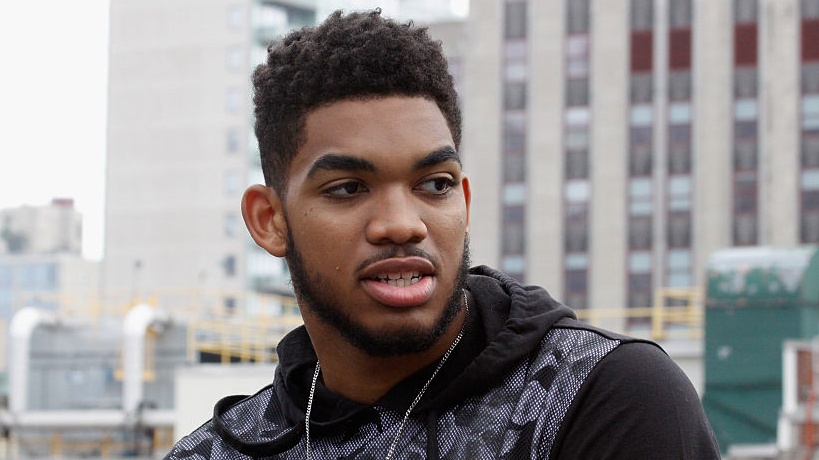NBA All-Star Karl-Anthony Towns, who lost his mom earlier this year due to COVID-19, revealed that a total of seven of his family members have died during the pandemic. The Minnesota Timberwolves center spoke to reporters on Friday as his team prepares for the upcoming season and discussed the challenges his family has been facing during this unprecedented time, ESPN reported.
“I lost a lot of close family members, people who have raised me, I’m trying to get through that," the basketball superstar said during a virtual press conference. "I’m trying my best to keep my family safe, just like my mom. So I’m trying to keep my sister, the kids, my dad, out of harm’s way. I’ve seen a lot of coffins in the last seven months, eight months.”
Most recently, the six-year NBA veteran lost his uncle.
“I’ve been through a lot, obviously starting out with my mom,” Towns said. “Last night I got a call that I lost my uncle. I feel like I’ve been hardened a little bit by life and humbled.”
The 25-year-old athlete, who already carries the burden of bringing glory to an entire city, is now facing the challenge of making sure he can keep the rest of his family safe.
"I've seen a lot of coffins in the last seven months," Towns said. "I have a lot of people who have — in my family and my mom's family — gotten COVID. I'm the one looking for answers still, trying to find how to keep them healthy. It's just a lot of responsibility on me to keep my family well informed and to make all the moves necessary to keep them alive."
Shortly before his mother, Jacqueline Cruz-Towns, died on April 13, the All-Star went to Instagram to share an emotional video about his loved one's battle with the coronavirus, as Blavity previously reported.
“She just wasn't getting better. Her fever was never cutting from 103, maybe go down to 101.9 with the meds, and then immediately spike back up during the night," he said. "She was very uncomfortable. Her lungs were getting worse, her cough was getting worse. She was deteriorating. She was deteriorating — and we always felt that the next medicine would help. This is the one that's going to get it done. This mixture is going to get it done.”
Towns has shared more posts on social media to educate the public about the dangers of the disease.
"I didn't want people to feel the way I felt," he said. "I wanted to try to keep them from having the ordeal and the situation I was going through. It just came from a place that I didn't want people to feel as lonely and upset as I was. I really made that video just to protect others and keep others well-informed, even though I knew it was going to take the most emotionally out of me that I've ever been asked to do."
With the NBA season just a few weeks away, the devastated son will now miss the familiar sight of his mom in the stands during his games.
"It always brought me a smile when I saw my mom at the baseline and in the stands and stuff and having a good time watching me play," Towns said. "It is going to be hard to play. It's going to be difficult to say this is therapy. I don't think [playing basketball] will ever be therapy for me again. But it gives me a chance to relive good memories I had."
Fortunately for the former No. 1 overall draft pick, he will have the support of his teammates, who are already helping him navigate the difficult period. Towns said he has been receiving dozens of calls from teammates such as D'Angelo Russell as well members of the Timberwolves organization.
Research shows the pandemic has disproportionately impacted minority groups. According to the CDC, Black, Hispanic and Native American people infected with COVID-19 are nearly four times more likely to be hospitalized than whites. Black and Hispanic people are also dying at a higher rate due to the pandemic, CNN reported.
"We've learned a lot about how to treat this disease as well as more about how to prevent it with wearing masks and social distancing," Dr. Lisa Cooper, director of the Johns Hopkins Center for Health Equity, told CNN. "The problem is that for people who still are having challenges with access to health care it doesn't mean things are getting better for them."
Studies have also revealed that Black people are less likely to take vaccines for COVID-19. According to a survey conducted by The Undefeated and the Kaiser Family Foundation, about half of the Black people who participated in the poll said they have no plans to take the vaccine.
"My biggest fear is that our community will not participate in this process to change our outcomes. I would not recommend this vaccine if I did not believe that it was safe," Morehouse School of Medicine president Valerie Montgomery Rice said. "My hope is that our community will believe that they have trusted messengers, trusted advocates, trusted entities at the table looking out for them."
